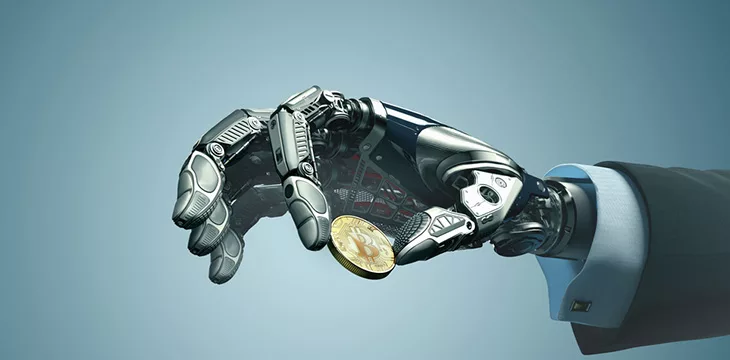|
Getting your Trinity Audio player ready...
|
In Bitcoin SV (BSV), we’re 5-10 years ahead of the curve in finding use cases for blockchain technology. The big question is, does that put BSV at an advantage… or a disadvantage?
We often make our arguments to audiences that aren’t listening or are listening but need help understanding. Now, much of the technology conversation is shifting to artificial intelligence (AI), which faces similar problems. Only one thing’s for sure: both will continue to advance whether the broader public understands them or not, so being ahead of that curve is still useful.
Lessons learned, challenges faced, and related development topics were the starting point for a recent Twitter Spaces event hosted by the BSV Blockchain Association and long-time Bitcoiner Brett Banfe. They were joined by BA social media manager Crescenda Babiera and Two Hop Ventures’ Alex Fauvel in an existential discussion of where BSV development is going, the role of AI as tech’s current crowd favorite, and what sort of contributions newcomers to the industry could make. For those interested to hear more, a recording of the entire 2.5-hour discussion is available here.
Babiera asks if developers will become too dependent on AI, and we’ve already seen AI assistants on platforms like GitHub replacing human advice forums like Stack Overflow. There are other AI-related issues, such as legal liabilities for developers, defining and enforcing rules, the role of ideological manipulation in AI training, and whether people are ready for what’s coming.
Some technologists have even called for a pause in AI development, which may be based on sound reasoning but is unlikely to happen. If people see a future advantage in being ahead of the AI development curve, they’ll ensure it progresses regardless of the law or ethics. Fauvel suggests blockchain-based AI training data makes the concept “a lot less scary” since it introduces stricter data-access controls and transparency.
Does anyone really care about BSV’s technological advantages?
There’s some discussion over whether we’re “putting the cart before the horse” by trying to argue BSV’s case for scalability when after 14 years, blockchain still hasn’t seen enough compelling use cases launched using the technology to require it. Though plenty of potential use case examples require massive scaling, most remain unaware of their benefits until they exist (it could be argued that Bitcoin’s problem is more “chicken-and-egg” rather than horse and cart, and this is an old debate).
We could make similar statements about BSV’s focus on data ownership and privacy. Once again, though having full control over your personal data and who may access it is beneficial, there isn’t a lot of demand for it outside of the relatively niche groups that understand why it’s important. And the same could apply to any policy, even in areas outside the technology space like politics, economics, finance, and social issues—sound policy decisions require in-depth knowledge, and in-depth knowledge comes only from people who have a keen interest in those topics, to begin with.
The BSV industry talks about data integrity, key-based access controls, the benefits of proof-of-work transaction processing, and audit trails. Then it bemoans the fact that everyone outside the blockchain world wants to talk about coin prices and non-fungible token (NFT) trading. We frequently say “education is important” to an audience that only wants to hear about how they can earn more dollars and social media likes.
It’s true we live in an “attention economy” where those “likes” can be as valuable as money—this is proven when we see people going to more extreme lengths to build their viewer counts, engaging in stunts that result in bodily harm or legal punishments.
“Technology is pure logic, but it’s often the ‘people stuff’ that gets in the way,” he says of AI. In this sense, AI, Bitcoin, and even religion have similarities: they were sets of rules and processes launched on an unsuspecting public, and it was up to a neophyte public to discover what to use them for. The public had no prior understanding of these processes or their purpose, and as a result, we got misuse, conflicts, and self-appointed gurus who told us all what to believe according to their own opinions.
Take “crypto trading” as a prime example. It’s true that digital asset exchanges effectively function as casinos. However, the fact that literal casinos still exist in the 21st century proves there’s still ample demand for gambling services—people still enjoy that thrill, the rush of winning big by sheer chance and jumping ahead of the pack by getting rich quickly.
These use cases for the new technology advanced faster than more esoteric blockchain use cases because they are more universally easy to grasp. Even the Bitcoin white paper talks mainly of digital cash without intermediaries, not about audit trails for Big Data applications or the perils of social media’s collection of personal data dossiers.
Banfe likens being ahead of the Bitcoin curve to playing a sport where you reach the goal first, then notice there’s no one cheering.
“The first place to start, and often the last place to go, is the Bitcoin white paper … it’ll save you a lot of headache and a lot of time. Ask yourself if the Bitcoin you know today is meeting the specifications in that white paper.”
Fauvel says the current socio-political environment is actually helping BSV and blockchain’s cause. There are high levels of mistrust in elections, government, and the media—this is creating problems in society no matter how much this mistrust is based on facts. Blockchain is a technology that promotes trust, transparency, and accountability, so there’s an opening for advocates to promote its benefits.
We’re also seeing more debates on how online content creators should get paid and how much users should pay for services, as well as more questions appearing over how providers of “free” online services are becoming insanely wealthy. Blockchain can answer this question and also solve its problems with data ownership and nanopayment economies.
Funding BSV development
While investor Fauvel touches on (BSV) “society politics” like Dr. Craig Wright statements, the role of nChain, Slictionary word definitions, and Twetch culture, he says as long as we all agree on the core principle that “Bitcoin’s rules never change,” everyone in the industry will get along fine.
He adds that it might be too early for the wider investment community to go all-in on blockchain and BSV. For developers, he says it’s important to remember that you may be choosing a “career in Bitcoin” without specific jobs being available to you. You must make a choice and define your own path, he says. That sort of adventure is scary to some and exciting for others, but if you’re the latter type, it’s a tough road that could be rewarding.
In order for artificial intelligence (AI) to work right within the law and thrive in the face of growing challenges, it needs to integrate an enterprise blockchain system that ensures data input quality and ownership—allowing it to keep data safe while also guaranteeing the immutability of data. Check out CoinGeek’s coverage on this emerging tech to learn more why Enterprise blockchain will be the backbone of AI.
Watch: Discussion: BSV vs other blockchains—the differences that matter

 07-11-2025
07-11-2025 





